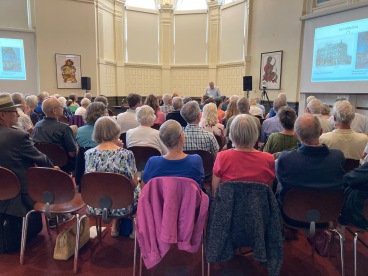I’ve been working my way through Konstantin Paustovsky’s 6-book Story of a Life this month. I heard about Paustovsky on The Mookse and the Gripes podcast and was drawn to his work when I discovered he was an almost-exact contemporary of my grandfather, about whom I’ve been thinking on account of last fall’s trip to the Caucasus. My grandfather was born in Molotschna Colony, Ukraine (then Russia) in 1890 and Paustovsky was born in Kiev, Ukraine in 1892.
I was also pleased to discover that the entire series is held at the Vancouver Public Library. I took them all out.
Since I may — someday — do a personal essay about my grandfather in the Caucasus during WWI, reading Paustovsky is a kind of research, though of the most pleasurable variety, for he writes vividly, not at a distance but from within each experience as it occurred. During the war he worked on a medical train, as did my grandfather. He was in Moscow during the early revolutionary period, when the city was “one solid, seething, endless public meeting.” He was in Kiev during part of the 3-year period when Ukraine underwent civil war and 17 political upheavals.
The first three books were especially compelling, but I will persist to the end because after a year in Odessa during the blockade (Vol. 4), Paustovsky spends time in the Caucasus in Vol. 5, which I’ve reached too. I look forward to his descriptions of that region.
Mennonite/s writing
I’ve also worked my way this month through On Mennonite/s Writing, selected essays by Hildi Froese Tiessen — “a scholar widely recognized as the primary critical figure in contemporary Mennonite literary studies” — recently published by CMU Press. The selecting of 18 essays, from her more than 80 contributions in the form of essays, book chapters, special journal issues, and so on–was done by Robert Zacharias. He also provides a fine introduction to Froese Tiessen’s overall work and this collection.
This is an important book, both in terms of honouring Froese Tiessen and of encapsulating a history of critical engagement with Mennonite literature. It was also fun to read.
I think I may have read some of the essays before, and certainly had some sense of the emergence of a so-called Mennonite literature, but I enjoyed starting at the beginning with her first essay in 1973 about Rudy Wiebe’s work, and seeing, in real time as it were, her continuing and developing insights into what was going on, especially in the relationship of Mennonite writers and their Mennonite community.
I read this book as a reader of Mennonite literature — and do recommend it to other readers and to students of literature — but I also enjoyed it as one of those “writers who happens to be Mennonite,” whose work came along rather later, in the wake of the period she especially observes. Reader or writer, we will all likely share the question of what comes next, and may have our opinions about what should or could, for as Froese Tiessen makes clear, the field has changed and continues to change. Her last essay describes the shift as one of “Mennonites as a community written about” to “Mennonites as a community writing.”
Two asides, or additional points of interest for me. The essay on the “forever summer, forever Sunday” trope of the Mennonite past in Russia, which entered the work of Rudy Wiebe, Sarah Klassen, David Waltner-Toews, and Sandra Birdsell (“Between Memory and Longing”) struck me as almost ironical as Froese Tiessen discerns/articulates an effect she herself could be said to have created. (She and her husband published a book of Peter Gerhard Rempel’s photographs of Mennonites in Russia with that title.) Perhaps an element of such circularity also characterizes her wider contribution to the field.
And then, in the middle of the book, in the essay “The Case of Dallas Wiebe,” three poems! His voice “distinctive enough to unsettle or inspire,” she says quite rightly. From the poem “God Speaks to the Geriatric Convention,” lines that sprung out to me:
You should imagine
that when you walk
through the valley of the shadow of death
that I am the one
who casts the shadow.
Reflecting on her life’s work, Froese Tiessen says, “[D]uring that irruption of Mennonite writing concentrated in the last two decades of the last century I had found myself, so often, right there, right then.” We can be grateful she was there, then, for her thinking is astute, her writing is clear and accessible, and her impact was enormous.





 with two writers of literary books about the Russian Mennonite experience that bookended the day: Sarah Klassen with her recent The Russian Daughter and Sandra Birdsell with The Russlaender. I think it brilliant to feature literature together with history. (David Bergen will be up tomorrow with his new book set in that experience.)
with two writers of literary books about the Russian Mennonite experience that bookended the day: Sarah Klassen with her recent The Russian Daughter and Sandra Birdsell with The Russlaender. I think it brilliant to feature literature together with history. (David Bergen will be up tomorrow with his new book set in that experience.)

